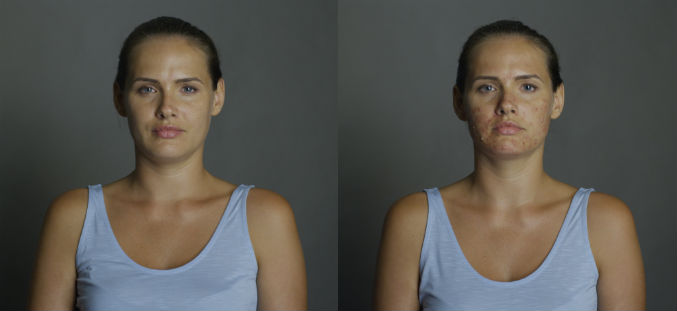Acne isn’t just for teens. In fact, more than half of all women over the age of 25 suffer some form of facial acne. Now, a compelling new video has highlighted what it’s like to live with adult acne and we look at the options available for help
In one of the videos, created by Sk:n Clinics, model and actress Megan Morewood was made up by celebrity make-up artist Liz Tagg to look like an acne sufferer, with thick, angry pustules covering her face and neck. Normally clear-skinned, Morewood’s sister is an adult acne sufferer. After 24 hours in her new skin, she said: ‘I feel less confident, something my sister has had to deal with for years.’
Dr Daron Seukeran, sk:n dermatologist, said: ‘Acne sufferers are sensitive to certain hormones that cause increased oil production and a higher turnover of skin cells, leading to changes in bacteria and ultimately, to outbreaks. While there is no cure for acne, treatments are available to help reduce outbreaks and their severity.’
Unfortunately, he explained that because it isn’t a condition that is widely discussed, people rarely know who to contact for help with their acne. ‘GPs are limited in what they can prescribe or advise,’ says Dr Seukeran.
In the last three years there has been an increase in acne in women in their 20s, 30s and 40s,’ says Dr Nicholas Lowe, consultant dermatologist at London’s Cranley Clinic. ‘One of the theories is that more women than ever are in stressful jobs and it’s affecting their skin.’ All acne is triggered by an excess of male or ‘androgenic’ hormones that over-stimulate skin’s oil glands causing it to become blocked and inflamed. ‘Stress causes an over-production of the hormone cortisol,’ says Dr Lowe. ‘That leads to increased androgens, oil production and acne. Controlling stress is a key step in controlling spots.’ So what can be done?
Over the counter ‘Look for cleansers and spot gels containing salicylic acid, which helps dry pimples,’ says Dr Lowe. ‘Don’t be afraid to dab spot gels on up to five times a day at the first sign of a spot.’
Just launched from La Roche Posay, the skin range loved by dermatologists, is Efflacar 3-step Blemish Control System (£32.50 from Boots), an acne treatment system tested on UK women and found in trials to reduce blemishes by 72 per cent.
Medical Help ‘Topical and oral antibiotics taken for up to six months and certain contraceptives pills (such as Yasmin) can help clear acne,’ says Dr Lowe. ‘We can also prescribe Vitamin A creams to treat both wrinkles and spots.’ If that fails, a dermatologist may put you on a course of Roaccutane. ‘We now use lower doses which minimize side effects people may have read about such as mood changes, hair loss and dry skin,’ says Dr Lowe. Therapies such as Intense Pulsed Light (IPL) therapy and blue light laser treatment (one type is called Isolaz from Sk:n Clinics nationwide) can help with surface spots.
Stress Solution Talk to your GP about a course of Cognitive Behavioural Therapy (CBT) which can help you deal with stress-causing thought patterns or compulsive picking – you may be entitled to it through the NHS. Or try Biofeedback therapy, in which you systematically learn to relax by observing your body’s physical responses. A study published in the Journal of Psychosomatic Research found that 12 sessions over six weeks significantly reduced acne. Find a therapist at healers.co.uk
More info acne.org
Like this article? Sign up to our newsletter to get more articles like this delivered straight to your inbox.





















































